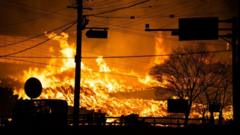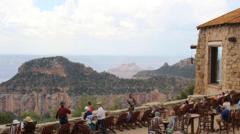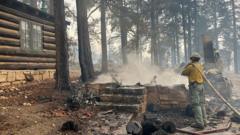Authorities are grappling with a climate crisis that has left severe destruction in its wake while calling for urgent measures to prevent future occurrences.
**Tragedy Strikes as Deadly Wildfires Sweep Through South Korea**

**Tragedy Strikes as Deadly Wildfires Sweep Through South Korea**
At least 24 lives have been lost and thousands evacuated in what is being termed the worst wildfire disaster in South Korea's history.
Amidst raging wildfires in South Korea’s southeast region, at least 24 individuals have tragically lost their lives, most of whom were elderly. The infernos, which sparked on Friday in Sancheong county, have led to the injury of 26 people, with 12 in critical condition, and have forced over 23,000 residents to flee their homes, creating an unprecedented humanitarian crisis. Acting President Han Duck-soo stated that the ongoing disaster is "rewriting the record books for the worst wildfires in our nation's history."
The fires have particularly devastated Uiseong city, engulfing the historic Gounsa temple, a site built in 618 AD that held significant cultural importance. Efforts to protect invaluable relics were made, with many being transferred to safer locations before the flames advanced. As the wildfires spread, they impacted neighboring regions including Gyeongbuk and Andong, fueled by strong, dry winds.
The national fire agency has escalated the emergency response to its highest alert, while a firefighting helicopter tragically crashed in the mountains of Uiseong, resulting in the pilot's death—an incident now under investigation. Thousands of firefighters and around 5,000 military personnel, along with US military helicopters, have been mobilized to combat the expanding flames.
In a stark illustration of the disaster’s enormity, one local resident described the scene as "like the apocalypse," as homes in the village succumbed to the flames. The wildfires have already engulfed approximately 17,000 hectares (42,000 acres) of forest, marking them as the third largest in South Korea’s recorded history.
As firefighters struggle against ongoing harsh conditions and the imminent threat of further flames, Acting President Han expressed a desperate hope for rain that is currently not expected in the immediate forecast. The nation has witnessed a significant increase in wildfire events recently, with 244 recorded this year alone—a 2.4 increase compared to the same period last year. The government now pledges to reinforce regulations against illegal burning, an ongoing concern that significantly contributes to wildfire causes, in hopes of shielding the future from such catastrophic events.
The fires have particularly devastated Uiseong city, engulfing the historic Gounsa temple, a site built in 618 AD that held significant cultural importance. Efforts to protect invaluable relics were made, with many being transferred to safer locations before the flames advanced. As the wildfires spread, they impacted neighboring regions including Gyeongbuk and Andong, fueled by strong, dry winds.
The national fire agency has escalated the emergency response to its highest alert, while a firefighting helicopter tragically crashed in the mountains of Uiseong, resulting in the pilot's death—an incident now under investigation. Thousands of firefighters and around 5,000 military personnel, along with US military helicopters, have been mobilized to combat the expanding flames.
In a stark illustration of the disaster’s enormity, one local resident described the scene as "like the apocalypse," as homes in the village succumbed to the flames. The wildfires have already engulfed approximately 17,000 hectares (42,000 acres) of forest, marking them as the third largest in South Korea’s recorded history.
As firefighters struggle against ongoing harsh conditions and the imminent threat of further flames, Acting President Han expressed a desperate hope for rain that is currently not expected in the immediate forecast. The nation has witnessed a significant increase in wildfire events recently, with 244 recorded this year alone—a 2.4 increase compared to the same period last year. The government now pledges to reinforce regulations against illegal burning, an ongoing concern that significantly contributes to wildfire causes, in hopes of shielding the future from such catastrophic events.




















